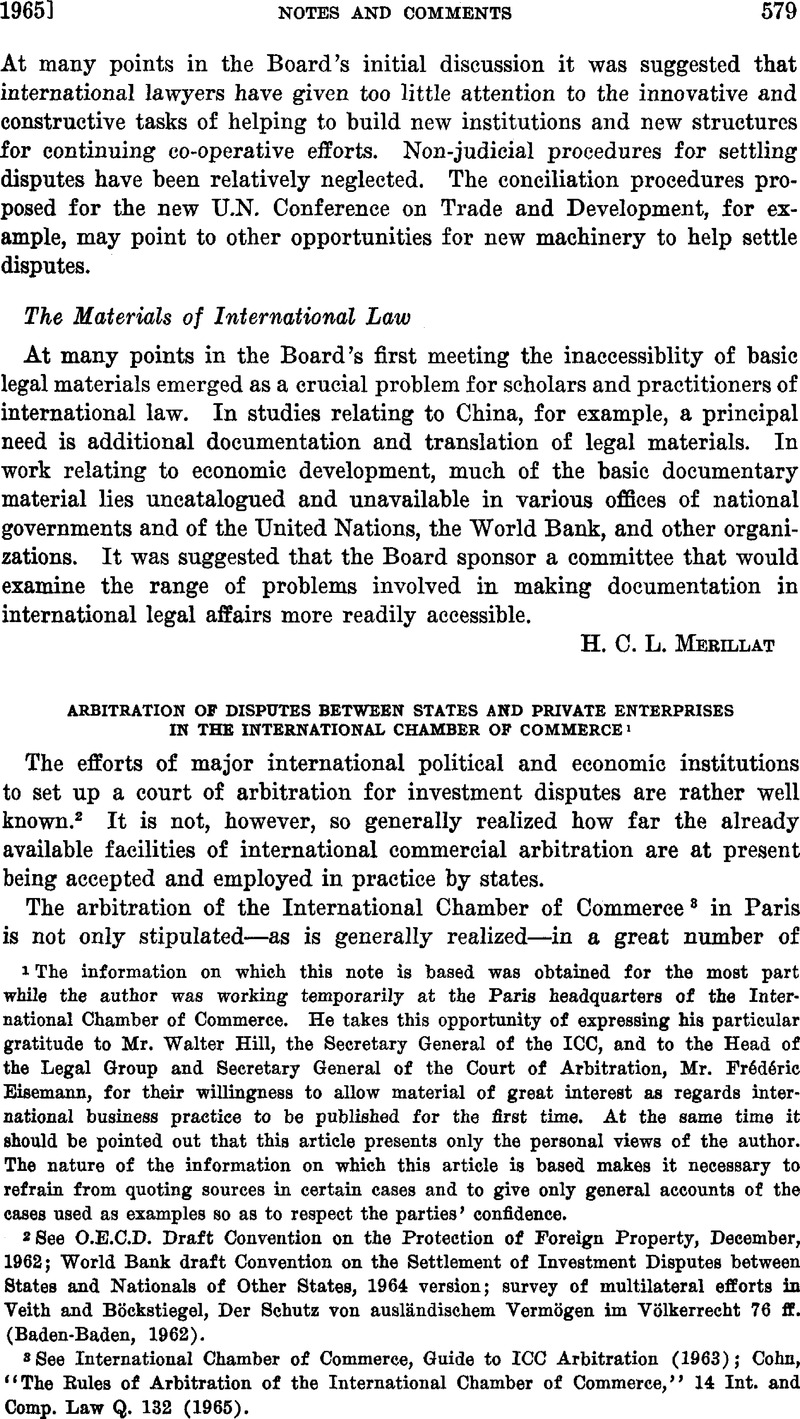Published online by Cambridge University Press: 28 March 2017

The information on which this note is based was obtained for the most part while the author was working temporarily at the Paris headquarters of the International Chamber of Commerce. He takes this opportunity of expressing his particular gratitude to Mr. Walter Hill, the Secretary General of the ICC, and to the Head of the Legal Group and Secretary General of the Court of Arbitration, Mr. Frédéric Eisemann, for their willingness to allow material of great interest as regards international business practice to be published for the first time. At the same time it should be pointed out that this article presents only the personal views of the author. The nature of the information on which this article is based makes it necessary to refrain from quoting sources in certain cases and to give only general accounts of the cases used as examples so as to respect the parties' confidence.
1 The information on which this note is based was obtained for the most part while the author was working temporarily at the Paris headquarters of the International Chamber of Commerce. He takes this opportunity of expressing his particular gratitude to Mr. Walter Hill, the Secretary General of the ICC, and to the Head of the Legal Group and Secretary General of the Court of Arbitration, Mr. Frédéric Eisemann, for their willingness to allow material of great interest as regards international business practice to be published for the first time. At the same time it should be pointed out that this article presents only the personal views of the author. The nature of the information on which this article is based makes it necessary to refrain from quoting sources in certain cases and to give only general accounts of the cases used as examples so as to respect the parties’ confidence.
2 See O.E.C.D. Draft Convention on the Protection of Foreign Property, December, 1962; World Bank draft Convention on the Settlement of Investment Disputes between States and Nationals of Other States, 1964 version; survey of multilateral efforts in Veith and Böckstiegel, Der Scbutz von ausländischem Vermögen im Völkerrecht 76 ft. (Baden-Baden, 1962).
3 See International Chamber of Commerce, Guide to ICC Arbitration (1963); Colin, “The Rules of Arbitration of the International Chamber of Commerce,” 14 Int. and Comp. Law Q. 132 (1965).
4 This attitude is also stated by the U.N. Secretary General, in his report, The Promotion of the International Flow of Private Capital 103-103 (E/3492) (1961), to the 32nd session of ECOSOC, to be one of the basic reasons why, in spite of the acceptance of ICC arbitration in many contracts between state authorities and private firms, the suggestions by certain institutions, which are at present being studied, are inclined to favour the setting up of a new form of arbitration for investment disputes rather than any extended use of the facilities already available through the ICC.
5 In one of these cases, arising out of the Dawes Plan, a dispute came up in 19 38, and the ICC was called upon to appoint the chairman of the arbitral tribunal.
6 The Yugoslav Federal Economic Chamber, for instance, systematically encourages firms to stipulate ICC arbitration, and these include the ICC clause in most of their foreign dealings. A whole series of such contracts has already given rise to arbitration before the ICC Court.
7 ICC Doc. 420/93.
8 “ … it would be contrary to the interests of the State to prohibit its representatives from accepting a means of settling its disputes in accordance with the customs of international trade, considering that its refusal would often entail the breaking off of negotiations.” The view of the Paris Court of Appeal, in a judgment given on April 10, 1957 (Revue de 1'Arbitrage, 1957, pp. 16 ff.). The decision concerns contracts between the French Government and foreign manufacturers of arms in the years 1939-40. According to the ruling of the Conseil d'Etat, this departure from the law prohibiting submission to arbitration is possible only in exceptional cases. In this connection see also the Report of the French Committee on Arbitration,ibid. 34 ft'.
9 In the years 1961-1963 arbitrators, conciliators or parties from 37 countries took part in proceedings before the ICC Court of Arbitration. Countries from every continent were represented: Latin America (Argentina, Chile, Panama, etc.), Africa (Ethiopia, Liberia, Morocco, Senegal, South Africa), Asia (India, Iran, Iraq, Israel, Japan, Lebanon, Pakistan, Syria, Thailand) and Australia. ICC Biennial Report 46.
10 ICC Doc. 420/92.
11 For further ICC resolutions on the encouragement of international arbitration and on co-operation in this field with other international organizations, see 15th Congress, Tokyo, 1955, ICC Brochure 186, p. 81; 18th Congress, Copenhagen, 1961, ICC Brochure 217, p. 96; 19th Congress, Mexico City, 1963, ICC Brochure 230, p. 94.
12 See Nussbaum, ‘ ‘ The Arbitration between the Lena Goldfields Ltd. and the Soviet Government,” 36 Cornell Law Q. 31 (1950), and letter of Manley O. Hudson to the New York Times, May 6, 1951, sec. 4, p. 8 B, col. 7. The text of the award appears in The Times (London), Sept. 3, 1930, p. 7, col. 1, and 36 Cornell Law Q. 42 (1950). See generally, Carabiber, Revue de 1'Arbitrage, 1964, pp. 3 ff.
13 See further in this respect: Böckstiegel, Die allgemeinen Grundsätze des Völkerrechts über Eigentumsentziehung 128 ff. (Berlin, 1936), and Neue Entwicklungen im Internationalen Enteignungsrecht 361 ff., Aussenwirtschaftsdienst des Betriebsberaters (1963).